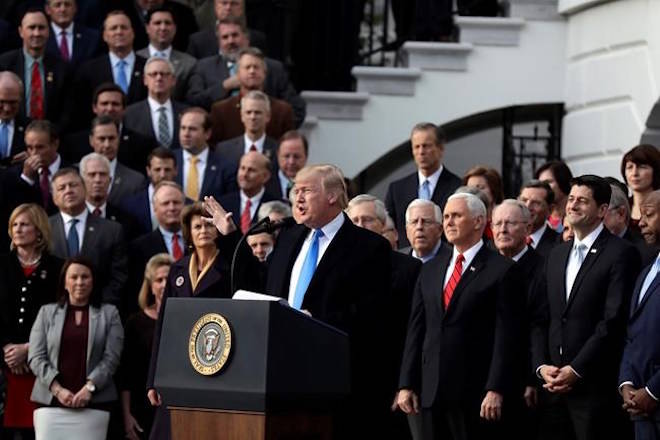While they have slightly differing views on the landmark tax cuts just adopted in the U.S., and their potential effect on Canada, some of the country’s leading fiscal-policy experts agree on one thing.
In short: Don’t expect Canada to engage in a corporate-tax-cut-war with the U.S. That’s according to three prominent fiscal experts contacted by The Canadian Press as the U.S. passed a bill that will make it cheaper to do business down south.
Kevin Page, Jack Mintz, and Kevin Milligan all agreed Canada has different policy tools to respond. And they expressed doubt the likeliest tool involves taking a chainsaw to corporate tax rates.
The University of Calgary’s Mintz believes Canada should worry about its neighbour’s tax reform; he’s expressed it in National Post pieces with titles like, “Trump’s tax tsunami is about to wallop Canadian jobs and investment.”
His view is that for several decades Canada had two business advantages: lower corporate taxes, and free trade. Now the taxes are about equal, and free trade is in jeopardy. He said Canadian businesses also face new challenges, like carbon taxes; while the U.S. eliminates regulations.
But he said Canadian policy-makers can respond with a variety of solutions. One is tax rates. Others include simplifying regulation, or designing tax policy to benefit investment, say, by steering the proceeds of carbon taxes back to businesses.
“There are a gamut of different policies,” he said in an interview.
“It’s wrong to think that a single nugget is going to solve, deal, with the issue.”
He suggests Canadians seek some clues in an annual World Bank document. In the bank’s annual Doing Business report, Canada scores high in several places — it’s No. 2 in the world for ease of starting a business.
But it points to sore spots.
Overall, Canada ranks as the 22nd-best country to run a business, sandwiched between Lithuania and Malaysia — 13 spots behind its neighbour, the U.S. It’s 57th in dealing with construction permits, and 108th in getting electricity.
Page, Canada’s first parliamentary budget officer, also doubts copycat tax cuts are coming.
“I think it is unlikely Canada will try to match U.S. tax cuts,” Page said in an email.
“Tax reform pressures will likely build in Canada over the next few years leading up to the 2019 elections but it is more likely to have a broader agenda than tax reductions , including fairness, sustainability, growth, (the) environment.”
He said corporate income taxes are one important cost of doing business — but that companies look at a variety of things: dividend, capital and payroll taxes; regulations; and production costs like wages.
He said Canada might even draw some early benefit from the U.S. tax bill. That’s because economic growth in the U.S. tends to spill into Canada. Scotiabank’s models estimate that for every percentage point of growth in the U.S., there’s a half-point growth in Canada.
Page said he expects a short-term positive impact for Canada. But he said that dissipates as the bill’s less-desirable aspects kick in — like the $1.5 trillion added to the debt, Republicans’ talk of offsetting that through social-spending cuts, growing inequality, and the diminished fiscal manoeuvring room whenever another recession hits.
He offers a term to describe the temporary boost for Canada: ”A sugar high.”
Kevin Milligan, a UBC economist who has advised the Trudeau Liberals on tax reform, said he’s not nearly as concerned about this bill as he would be if it gave U.S. businesses a permanent tax advantage of, say, five percentage points, rather than simply putting the countries at similar rates.
“Then we’d be in a world where we’d be really, perhaps, in trouble — where you’d see firms wanting … to shift profits out of Canada. The fact that we’re tied, at about the same rate, means there’s no incentive to move profit,” he said.
“That’s why I don’t have apocalyptic concerns that some others might have expressed.”
He said businesses will continue making choices based on numerous factors, like the cost of providing health insurance to employees, a significant issue in the U.S.; good transit links; pleasant communities; workforce training; and the ability to attract talented immigrants — an area where Canada has gained some advantage, he said, given the current U.S. political climate.
“So that’s the question,” Milligan said.
“Are we best off getting into a tax-rate competition with the U.S., or competing on other grounds?”
Alexander Panetta, The Canadian Press



